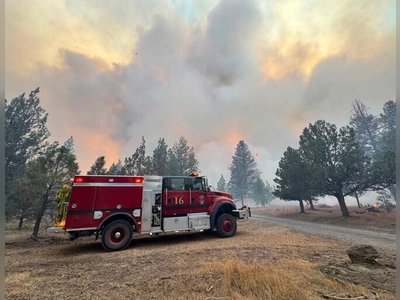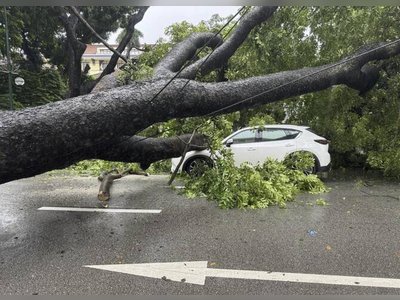
Pakistan Evacuates Thousands as India Releases Water from Overflowing Dams
Evacuations underway in Pakistan after neighboring India releases water from overflowing dams and swollen rivers.
Pakistan has initiated evacuations of tens of thousands of people to safer areas following India's release of water from overflowing dams and swollen rivers into low-lying border regions.
This move came a day after New Delhi alerted Islamabad about potential cross-border flooding, marking the first public diplomatic contact between the two nuclear-armed rivals in months.
Pakistan’s National Disaster Management Authority (NDMA) has issued an advance alert to its Punjabi counterparts regarding a surge in the Sutlej River and the risk of flooding.
The evacuation process is currently underway from various districts in Punjab province, with over 14,000 people evacuated from Kasur and more than 89,000 moved to safer ground from Bahawalnagar.
The NDMA has advised residents to avoid rivers, streams, and low-lying areas, restrict unnecessary travel, and follow alerts issued through the media, mobile phones, and the NDMA’s disaster alert app.
These flood warnings come as heavy monsoon rains continue to affect both South Asian countries.
In Pakistan's northwest, complaints have arisen about a lack of warning before flash floods struck Buner district, resulting in over 300 fatalities.
Officials indicate that the devastation was caused by sudden cloudbursts, which could not have been predicted, and many victims lived along natural water pathways.
Nationwide, floods triggered by seasonal rains have led to more than 800 deaths in Pakistan since June 26.
In Indian-administered Jammu Kashmir, at least 65 fatalities and hundreds of displacements have occurred.
The region's rivers and tributaries eventually flow into Pakistan and the part controlled by it.
Indian officials report that multiple rivers and streams are overflowing, with muddy waters flooding homes and damaging infrastructure such as roads and bridges.
According to the Indian Meteorological Department, rain is expected to persist until late Tuesday.
In 2014, Kashmir experienced its worst monsoon flooding in a century, resulting in 500 deaths across the region.
This week’s flood alert was conveyed through diplomatic channels rather than the Indus Waters Commission, which has been temporarily suspended by India following the killing of tourists in Indian-controlled Kashmir.
Pakistan asserts that India cannot unilaterally suspend the treaty.
The treaty has endured two wars and a major border skirmish between the countries without being suspended previously.
This suspension is part of a broader reduction in diplomatic ties resulting from tit-for-tat missile strikes following the killing of 26 tourists in Kashmir, which ended after US President Donald Trump brokered a ceasefire.
Recent months have seen Pakistan witness multiple cloudburst floods and higher-than-usual rainfall.
The country's annual monsoon season typically runs from July through September.
Scientists attribute heavier rains to climate change, raising concerns about the potential for similar flooding as occurred in 2022, which affected a third of the country and caused 1,739 deaths.
This move came a day after New Delhi alerted Islamabad about potential cross-border flooding, marking the first public diplomatic contact between the two nuclear-armed rivals in months.
Pakistan’s National Disaster Management Authority (NDMA) has issued an advance alert to its Punjabi counterparts regarding a surge in the Sutlej River and the risk of flooding.
The evacuation process is currently underway from various districts in Punjab province, with over 14,000 people evacuated from Kasur and more than 89,000 moved to safer ground from Bahawalnagar.
The NDMA has advised residents to avoid rivers, streams, and low-lying areas, restrict unnecessary travel, and follow alerts issued through the media, mobile phones, and the NDMA’s disaster alert app.
These flood warnings come as heavy monsoon rains continue to affect both South Asian countries.
In Pakistan's northwest, complaints have arisen about a lack of warning before flash floods struck Buner district, resulting in over 300 fatalities.
Officials indicate that the devastation was caused by sudden cloudbursts, which could not have been predicted, and many victims lived along natural water pathways.
Nationwide, floods triggered by seasonal rains have led to more than 800 deaths in Pakistan since June 26.
In Indian-administered Jammu Kashmir, at least 65 fatalities and hundreds of displacements have occurred.
The region's rivers and tributaries eventually flow into Pakistan and the part controlled by it.
Indian officials report that multiple rivers and streams are overflowing, with muddy waters flooding homes and damaging infrastructure such as roads and bridges.
According to the Indian Meteorological Department, rain is expected to persist until late Tuesday.
In 2014, Kashmir experienced its worst monsoon flooding in a century, resulting in 500 deaths across the region.
This week’s flood alert was conveyed through diplomatic channels rather than the Indus Waters Commission, which has been temporarily suspended by India following the killing of tourists in Indian-controlled Kashmir.
Pakistan asserts that India cannot unilaterally suspend the treaty.
The treaty has endured two wars and a major border skirmish between the countries without being suspended previously.
This suspension is part of a broader reduction in diplomatic ties resulting from tit-for-tat missile strikes following the killing of 26 tourists in Kashmir, which ended after US President Donald Trump brokered a ceasefire.
Recent months have seen Pakistan witness multiple cloudburst floods and higher-than-usual rainfall.
The country's annual monsoon season typically runs from July through September.
Scientists attribute heavier rains to climate change, raising concerns about the potential for similar flooding as occurred in 2022, which affected a third of the country and caused 1,739 deaths.










